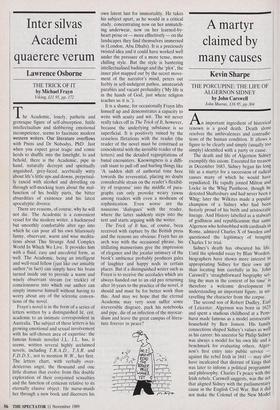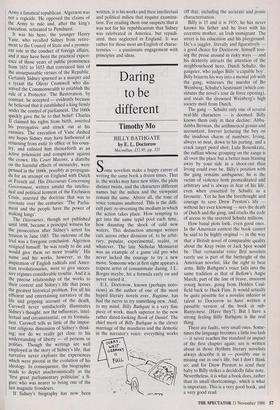A martyr claimed by many causes
Kevin Sharpe
THE PORCUPINE: THE LIFE OF ALGERNON SIDNEY by John Carswell
John Murray, £16.95, pp,304
An important ingredient of historical renown is a good death. Death alone resolves the ambivalences and contradic- tions of the human condition. It allows a figure to be clearly and simply (usually too simply) identified with a party or cause.
The death and life of Algernon Sidney exemplify this axiom. Executed for treason in December 1683, Sidney began his long life as a martyr for a succession of radical causes many of which he would have repudiated. He rapidly joined Milton and Locke in the Whig Pantheon, though he detested Shaftesbury and had never been a Whig; later the Wilkites made a popular champion of a Sidney who had been fiercely proud of his birth and aristocratic lineage. And History labelled as a stalwart of godliness and republicanism that same Algernon who hobnobbed with cardinals in Rome, admired Charles X of Sweden and questioned the legitimacy of bringing Charles Ito trial.
Sidney's death has obscured his life. Until the splendid essay by Blair Worden, biographers have shown more interest in appropriating Sidney for their own age than locating him carefully in his. John Carswell's 'straightforward biography set- ting the man in the context of his time' Is therefore a welcome development in understanding an important figure, in un- ravelling the character from the corpse. The second son of Robert Dudley, Earl of Leicester, Algernon was born in 1623 and spent a studious childhood at a Pens- hurst made famous as a model aristocratic household by Ben Jonson. His family connections shaped Sidney's values as well as his career: his ancestor Sir Philip Sidney was always a model for his own life and a benchmark for evaluating others. Alger- non's first entry into public service — against the rebel Irish in 1641 — may also have inculcated that distrust of kings that was later to inform a political programme and philosophy. Charles I's peace with the Irish rebels, Carswell suggests, was the act that aligned Sidney with the parliamentary cause in the English Civil War. But it did not make the Colonel of the New Model
Army a fanatical republican. Algernon was not a regicide. He opposed the claims of the. Army to rule and, after the king's execution, retreated to Penshurst.
It was his hero, the younger Henry Vane, who recalled Sidney from retire- ment to the Council of State and a promin- ent role in the conduct of foreign affairs, and it may have been the practical experi- ence of those years of public prominence from 1651 to 1653 that convinced him of the unsurpassable virtues of the Republic. Certainly Sidney spurned as a usurper and a tyrant the Oliver Cromwell who dis- solved the Commonwealth to establish the rule of a Protector. The Restoration, by Contrast, he accepted — evidently because he believed that it established a king firmly under the control of parliament. The 1660s quickly gave the lie to that belief: Charles II claimed his rights from birth, asserted his prerogative and struck out at his enemies. The execution of Vane dashed any hopes Sidney may have harboured of returning from exile to office or his coun- try, and enlisted him thenceforth as an active polemicist and conspirator against the crown. His Court Maxims, a diatribe on the harmful effects of monarchy, were penned in the 1660s, possibly as propagan- da for an attempt on England with Dutch or French aid. His Discourses Concerning Government, written amidst the intellec- tual and political ferment of the Exclusion Crisis, asserted the doctrine that was to resonate over the centuries: 'The Parlia- ment and the people have the power of making kings'. The Discourses, though not published until 1698. became a principal witness for the prosecution after Sidney's arrest for treason in June 1683. The outcome of the trial was a foregone conclusion. Algernon resigned himself: 'he was ready to die and Would give them no more trouble'. His name and his works, however, as the inspiration of English radicals and Amer- ican revolutionaries, were to give succes- sive regimes considerable trouble. And it is the precise relationship of the works to their context and Sidney's life that poses the greatest historical problem. For all his efficient and entertaining narrative of the life and gripping account of the death, Carswell never satisfactorily illuminates Sidney's thought, nor the influences, intel- lectual and circumstantial, on its formula- tion. Carswell tells us little of the impor- tant religious dimension of Sidney's think- ing; nor do we really get close to his understanding of liberty — of persons or polities. Though the writings are well employed in the story of Sidney's life, that narrative never explores the experiences which were pivotal in the evolution of his ideology. In consequence, the biographer tends to depict anachronistically as the `first great parliamentary politician' a fi- gure who was nearer to being one of the last magnate frondeurs.
If Sidney's biography has now been
written, it is his works and their intellectual and political milieu that require examina- tion. For reading them one suspects that it was not for his republicanism that Sidney was celebrated in America, but repudi- ated, then neglected in England. It was rather for those most un-English of charac- teristics — a passionate engagement with principles and ideas.











































































 Previous page
Previous page